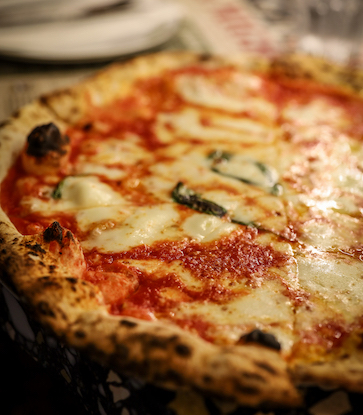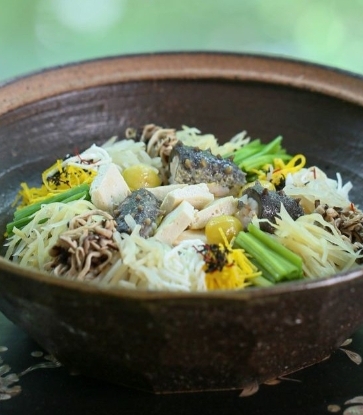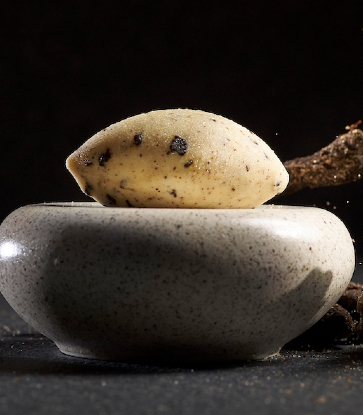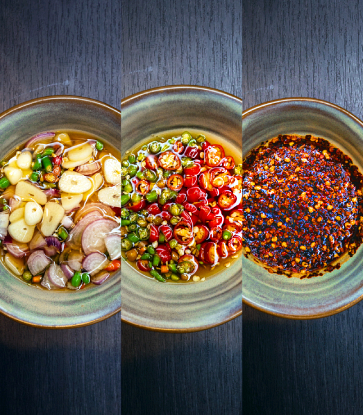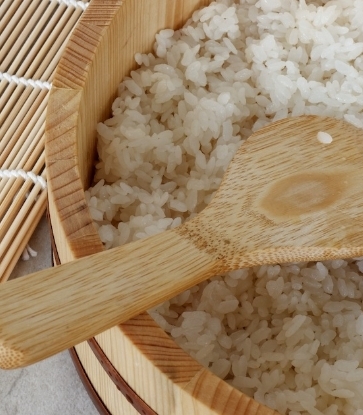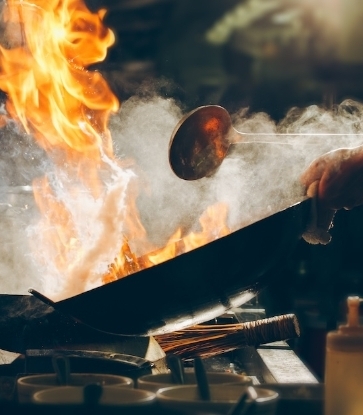We ask six chefs from MICHELIN Guide-featured restaurants to share their advice on essential ingredients to stock up on at home and tips for home cooks to get the most mileage out of them.

Pasta and Canned Tuna
Umberto Bombana, Chef of three-MICHELIN-star Italian restaurant, 8½ Otto e Mezzo - Bombana
Hailed as the “King of White Truffles”, Italian chef Umberto Bombana and his restaurant are well-known for their signature white truffle dishes. The three-MICHELIN-star venue also plays host to the annual white truffle auction in Hong Kong held every fall. Despite being well-versed with the most expensive ingredients in the world, Bombana's pick for his must-have pantry staples at this time are far more humble. Pasta and canned tuna are his comfort food and the main ingredients for his home-cooking during his 14-day self-isolation period.
“I am from Italy, and pasta is my comfort food. Pasta is so versatile because you can pair it with different sauces to create a wide variety of dishes. It should always be in your home. I can easily create ten pasta dishes using the ingredients that I have at home," he says. "Everyone in our family has their favourite pasta sauce: my favourite is fresh tomatoes paired with garlic, chili, capers and black olives. My son Bert loves Bolognese sauce, and my daughter Emma loves tomatoes with mozzarella."
There are no "special tricks" to cooking pasta, according to Bombana. "The most important thing is to watch the amount of time you use to cook the pasta in boiling water in order to keep it al dente. Canned tuna is so versatile and tasty — it is great as a pizza topping or for making a pasta sauce.”

Yuzu Kosho
Hidemichi Seki, Chef de Cuisine of two-MICHELIN-star Japanese restaurant, Tenku Ryugin
A kitchen veteran with more than 20 years of experience, Hidemichi Seki joined the three-MICHELIN-star Japanese restaurant, Ryugin in Tokyo, in 2003. He was appointed the deputy head chef for Tenku Ryugin, Ryugin's offshoot in Hong Kong, in 2012 and was promoted as the chef de cuisine for the restaurant just three years later. Honed by his experience in Ryugin, Hidemichi Seki is a disciplined and dedicated chef who seeks perfection in his cooking, right down to the littlest detail. Even for simple tasks such as making broth, he would sample it in bowls that he uses to serve his customers with in order to accurately imitate the guests’ experience. At home, this father of two spends time with his children by cooking at home, using yuzu kosho has his secret weapon for transforming ordinary dishes into delicacies. The Japanese condiment is made from fresh chilli peppers, salt, and the zest and juice of yuzu, a Japanese citrus.
“I love yuzo kosho as it can be kept for a long time. It has the ability to infuse new flavours into ordinary dishes. For example, apart from adding soft-boiled eggs and mayonnaise into a salad of tuna and green asparagus, you could toss in some yuzu kosho to bring extraordinary flavours. I often mix yuzu kosho with extra-virgin olive oil as a dipping sauce for fried or roasted chicken too.”
“Kosho” means “chilli” in the Kyushu dialect. The spicy paste has a texture like wasabi and a tart and slightly bitter tinge from the citrus peel. Yuzu kosho is well-stocked in various Japanese supermarkets in Hong Kong.

High-Quality Dried Scallops, Dried Shrimps and Organic Eggs
Siu Hin Chi, Executive Chef of two-MICHELIN-star Cantonese restaurant, Ying Jee Club
Chef Siu Hin Chi is a venerable name in the local dining scene. The master of classical Cantonese cooking has led some of Hong Kong’s finest restaurants with multiple MICHELIN stars over a long and illustrious career, including T’ang Court and Duddell’s. He joined Ying Jee Club in 2017, and led the restaurant to clinch one MICHELIN star within four months of opening. The restaurant rose to two MICHELIN stars the year after.
For chef Siu, high-quality ingredients make all the difference for Cantonese cuisines. His pantry staple picks? Dried scallops, dried shrimps and organic eggs.
“In times like these, it is best to stock up on non-perishable ingredients that are tasty and nutritious, such as dried scallops, dried shrimps and eggs. They are all very versatile and can be used for a variety of dishes," he explains. To make the simple classic Cantonese dish of steamed eggs with dried scallops and dried shrimps, all you need to do is to mix well the eggs with a little bit of salt and the water leftover from soaking the dried scallops, according to Siu. Steam a half portion of the egg mixture in low heat for 5 minutes, turn off the heat and rest for another 2 minutes. Then, add in the dried scallops, dried shrimps and the rest of the egg mixture, and steam for another 5 minutes. "Good quality ingredients could bring simple dishes to another level," he adds.
READ ALSO: The First Day We Got Our Stars: Siu Hin-Chi

Chilled Soup Base and Dumplings
Vicky Cheng, Chef-owner of one-MICHELIN-star "French x Chinese" restaurant, VEA
Chef Vicky Cheng is renowned for his ability to marry modern French techniques with Chinese ingredients, which is expressed in his signature dishes, Abalone Pithivier and Roasted Sea Cucumber. At home, a family favourite is his Braised Lion Head Croaker with Chinese Yellow Wine. For Cheng, the most important pantry staple for home-cooking are Chinese soup bases, such as chicken soup, pork bone soup or fish soup, and dumplings.
"A good soup base can be used to season any dish," he explains. For example, when you cook vegetables, adding a little chicken broth will greatly enhance the taste of the dish. Soup bases are very easy to prepare, Cheng says. First, buy some bones from your regular butcher or supermarket and have them chopped into smaller pieces. Add them into a pot of boiling water for a short while, and then to rinse them with clean water to remove any impurities. Then, place the bones into a clean pot, add some water and cook for 3 hours. After 3 hours, separate the residue from the soup and let them cool until they are ready to be packed into zip-lock bags. Remember to lay it flat when you store them into the refrigerator. "When cooking at home, I like to add Chinese cabbage, tofu skin, ginger and white pepper in pork bone soup or fish soup," Cheng shares.
Dumplings, meanwhile, have always been Cheng's go-to comfort food. You can buy ready-made ones or make your own. Cheng adds: "For homemade dumplings, there are a lot of simple recipes online that are interesting to make, or you can also include your favourite ingredients as you wish. The best thing about dumplings is that you can make a lot of them at a go, and then to store them in the refrigerator. When you want to eat them, simply boil or fry them. You can pair it with any sauce you prefer: hot sauce, pesto sauce made with coriander and spring onions, or soy sauce with a lot of vinegar. You get a lot of variety every time you eat dumplings."
READ ALSO: The First Day We Got Our Stars: Vicky Cheng

Cabbage and Potatoes
Leung Yu King, Executive Chinese Chef from one-MICHELIN-star Cantonese restaurant, Summer Palace
Chef Leung Yu King has been specialising in Cantonese cuisines for 33 years. At Summer Palace, his goal is to preserve the traditions of Cantonese cooking by imparting skills and knowledge to the next generation of chefs. He recommends cabbage and potatoes as pantry staples, which can be used in a number of comforting dishes and soups in Cantonese cuisines.
"Cabbage and potatoes are good to have at home in these times. They are easy to store and can be kept at room temperature without a refrigerator. Both ingredients are very good ingredients for home cooking, whether you are making soups, stews, or stir-fry," he says. For simple dishes such as Pork Rib Soup with Tomatoes and Potatoes, all you need is to slice the tomatoes and potatoes, blanch the pork ribs, and to boil all the ingredients together for 45 minutes. Claypot Chicken Soup with Wontons is another easy home recipe, he shares: Fill one-third of your clay-pot with water, add a few slices of ginger and a blanched chicken. Boil the chicken for half an hour, remove from heat and leave the lid on for 30 minutes. Then, turn on the heat again, add cabbage and cooked wontons into the claypot when the water boils again, and season the dish with salt when serving. "Soup is indispensable for Cantonese families, and is also a good source for hydration," he says.

Flour and Frozen Seafood
Albin Gobil, Chef de Cuisine from one-MICHELIN-star French restaurant, Gaddi’s
Albin Gobil joined Gaddi's in early 2019 after a stint in a two-MICHELIN-star restaurant in London. Inspired by the "modern classic” cooking style, he creates his dishes around the original taste of the ingredients instead of being overly elaborate. His recommendation for essential pantry staples are equally modest: flour and frozen seafood.
"Flour is a must-have in my kitchen. Not only can it be kept for a relatively long period of time, it is so versatile that you can use it in both sweet or savoury dishes," he says. "I like making crepes with flour. All you need is to mix flour, eggs, salt and milk together, and to add a little bit of rum, vanilla extract and melted butter. Pour the mixture into the pan and it takes only a few minutes to cook and serve.
"Frozen seafood can be kept in the refrigerator for several months, and is a great ingredient that everyone should have at home. Among a variety of seafood, Carabinero prawn is my favourite for its sweet and rich taste. I love to use it for making prawn soup: wash and clean the prawn heads, then fry them with butter, carrots, onion, garlic and ginger for 3 minutes until fragrant. Add tomato paste and cook for 2 minutes, and then add coconut milk and water, cook for another 45 minutes. Stir it with a blender until smooth, and strain the soup. You can also add lime leaves, lemongrass and chilli to enhance its flavour."
Banner photo courtesy of chef Umberto Bombana's Facebook Page



